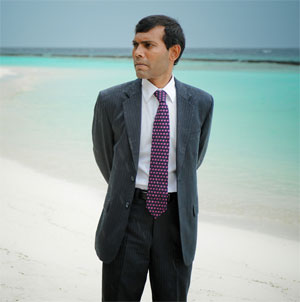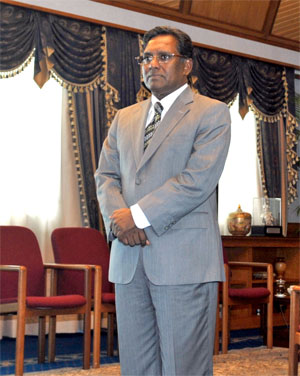With the biggest climate summit in years a month away, two presidents from one of the countries most vulnerable to rising sea levels, the Maldives, have written for Transparency International about the importance of transparent and accountable responses to the challenge of climate change.
Governance and climate change in the Rio +20

H.E. Mr Mohamed Nasheed, Former President of the Republic of Maldives
The Maldives is one of the world’s most climate-vulnerable nations, but was also one of the most ambitious countries in terms of policies to combat global warming. In 2009, I convened an underwater cabinet meeting in the Maldives. The effect was symbolic but the message was serious – that unless the world moves to take decisive action on climate change, countries like the Maldives will cease to exist – lost forever beneath the rising seas. In order to lead by example, the then Government also announced the Maldives’ determination to become the world’s first carbon-neutral country.
Climate change is an urgent and real threat not only for the Maldives. It knows no borders nor respects a nation’s sovereignty. It is a truly global issue. The urgency of the crisis is evident wherever you look today. However, as well as focusing on the problem, we must also direct our attention – and the focus on international financing mechanisms – on the solution. That solution is carbon neutral economic growth and development. Read more
Climate governance integrity

H.E. Dr Mohamed Waheed, President of the Republic of Maldives
Since I became President, one of my key priorities for securing the future of the Maldives is combating the very real challenge of climate change and its effect on our nation. Climate change threatens our sustainable developmental aspirations, our principal economic sectors – tourism and fisheries, our fragile ecosystems and the very existence of our country itself.
While Maldives contributes to less than 0.01% to the global emission of greenhouse gases, we are at the frontline of the predicted impacts of climate change and sea level rise. Our tourist resorts, which on average are positioned approximately 1.5m above mean sea level, are already experiencing environmental damage, due to climate change-related trends and effects. In addition, initial impacts are already being felt on coastal infrastructure, fisheries, water resources, agriculture and human health.
The Maldivian economy has been impacted by natural disaster before, as the 2004 Indian Ocean tsunami brought on an estimated direct loss of about US$298 million and total damages amounting to over US$470 million. The largest indirect losses occurred in the tourism sector due to the sharp decline in tourist arrivals following the incident. Read more















 Connect with us on Facebook
Connect with us on Facebook Follow us on Twitter
Follow us on Twitter